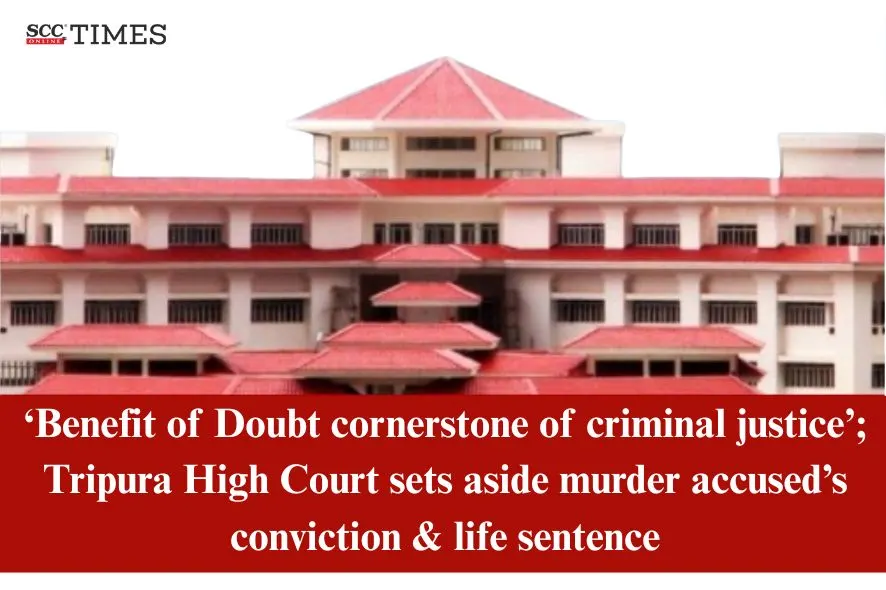Tripura High Court: In a criminal appeal where the convict was punished with life imprisonment under Section 302 of Indian Penal Code (IPC), the Division Bench comprising of Dr. T. Amarnath Goud* and Biswajit Palit, JJ opined that there is a significant distance between what “may be true” and “must be true,” which must be covered by clear, cogent, and unimpeachable evidence by the prosecution before an accused is condemned a convict. The Court found that there was misappreciation of evidence by the Trial Court and therefore, extending benefit of doubt to the accused, the Court set aside his conviction and life sentence.
Background
The husband (deceased) of the complainant went to the market while the complainant along with her two kids were asleep, when she heard some noises from outside her house. Hearing the noises, she went outside with a torch and found the dead body of the husband lying on her courtyard with a severe head injury. Listening to her hue and cry, one person arrived at her house and informed the matter to Gandacherra Police Station over mobile.
The accused of the crime was the brother-in-law of the deceased who allegedly killed him due to personal enmity over the frequent beatings, which the deceased gave his wife, while being intoxicated.
The matter went to the Trial Court, where the Additional Sessions Judge passed the judgement, convicting the appellant and punishing him with life imprisonment along with fine of rupees one lakh payable to the legal representatives of the deceased as compensation, under Section 357(b) Criminal Procedure Code, 1973 (CrPC), for Section 302 IPC, in default to which he would suffer further rigorous imprisonment for a term of 6 months.
Aggrieved by the said judgement, the appellant filed an appeal under Section 374 CrPC, before the High Court.
Analysis, Law and Decision
The Court individually looked into the testimonies of the prosecution witnesses and observed that all the testimonies consistently indicate that the witnesses either arrived at the spot of the incident and discovered the deceased in a pool of blood or heard of the incident from the others. The witnesses explicitly stated their inability to identify how the deceased sustained the injuries or who was involved in the incident.
Furthermore, it was also pointed out that the wife of the deceased and sister of the accused, also stated that she did not know who murdered her husband.
The Court opined that in the instant case, the prosecution fell short of establishing a complete and unbroken chain of circumstances necessary to conclusively prove the involvement of the accused. The lack of direct evidence from any eyewitness to the incident, coupled with the general ignorance of the material witnesses regarding the perpetrator, created significant doubt in the prosecution’s narrative.
Accordingly, the Court quashed and set-aside the order of conviction and sentence, concluding that the Trial Court’s judgment was based on a misappreciation of the evidence and settled principles of criminal law; because in the absence of clear and unimpeachable evidence, the benefit of doubt should have been extended to the accused.
[Mathura Tripura v. State of Tripura, 2025 SCC OnLine Tri 505, decided on:1-7-2025]
*Judgement authored by- Justice Dr. T. Amarnath Goud
Advocates who appeared in this case:
Advocate for the Petitioners- Subrata Sarkar, Sr. Advocate; Ayesha Saha Hirawat, U. Singha, A. Jamatia, Advocates.
Advocate for the Respondents- Rajib Saha, Addl. PP




